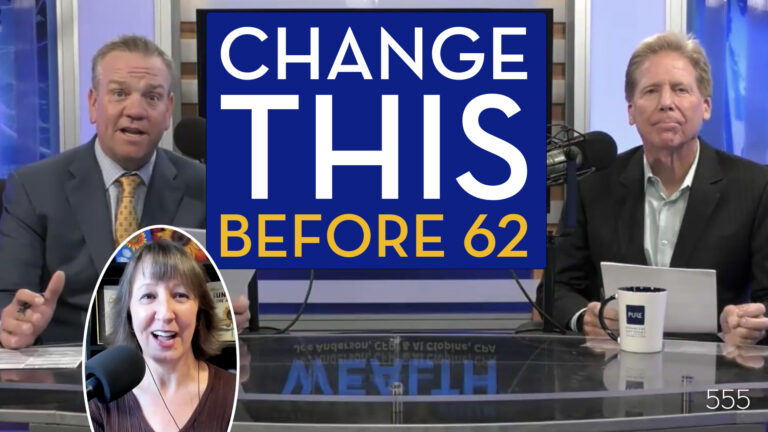Joe Anderson, CFP® & Alan Clopine, CPA share common retirement mistakes they’ve seen for years. These mistakes that could cost you thousands, if not more, can easily be avoided if you learn how.
00:00 – Intro
02:27 – “What we have found with a lot of you is that potentially you’re not going to be in a lower tax bracket.”
05:37 – “The people we work with have assets in retirement accounts, and in most cases they will be in the same tax bracket or higher because most people that will come into our office want to at least maintain their same lifestyle.”
09:32 – “You have to put a plan together to take a look at a forward-looking strategy.”
13:37 – “The first one (mistake) seems so obvious but we see it over and over again – it’s not having beneficiaries on your retirement plan or IRA or having the wrong ones on your IRA.”
17:34 – “As a CPA (Certified Public Accountant) for over 30 years, it does amaze me how many people fail to get the message about tax planning and strategies until they make a mistake that costs them thousands of dollars.”
22:57 – “There are a lot of different requirements to name the trust as the beneficiary.”
25:49 – “There is good justification for actually having a separate trust; it’s called an IRA trust which has nothing to do with your living trust and you set that trust up in such a way that when you pass away, your beneficiaries become sub-trusts and you can actually have the RMD (required minimum distribution) based upon each individual beneficiary.”
28:02 – “This isn’t so much a mistake but an underutilized strategy because a lot of people don’t really know about it. It’s called net unrealized appreciation (NUA).”
30:55 – “If you keep your tax bracket low enough, you can avoid the capital gains tax so you can get those assets out tax-free to you.”
34:46 – “Interest rates are at all-time lows, markets are volatile, we’re living a lot longer and healthcare costs – the list goes on and on.”
Listen to the YMYW podcast:

Amazon Music
AntennaPod
Anytime Player
Apple Podcasts
Audible
Castbox
Castro
Curiocaster
Fountain
Goodpods
iHeartRadio
iVoox
Luminary
Overcast
Player FM
Pocket Casts
Podbean
Podcast Addict
Podcast Index
Podcast Guru
Podcast Republic
Podchaser
Podfriend
PodHero
podStation
Podverse
Podvine
Radio Public
Rephonic
Sonnet
Spotify
Subscribe on Android
Subscribe by Email
RSS feed

YouTube Music
IMPORTANT DISCLOSURES:
Pure Financial Advisors is a registered investment advisor. This show does not intend to provide personalized investment advice through this broadcast and does not represent that the securities or services discussed are suitable for any investor. Investors are advised not to rely on any information contained in the broadcast in the process of making a full and informed investment decision.
• Investment Advisory and Financial Planning Services are offered through Pure Financial Advisors, LLC, a Registered Investment Advisor.
• Pure Financial Advisors LLC does not offer tax or legal advice. Consult with your tax advisor or attorney regarding specific situations.
• Opinions expressed are not intended as investment advice or to predict future performance.
• Past performance does not guarantee future results.
• Investing involves risk including the potential loss of principal. No investment strategy can guarantee a profit or protect against loss in periods of declining values.
• All information is believed to be from reliable sources; however, we make no representation as to its completeness or accuracy. As rules and regulations change, content may become outdated.
• Intended for educational purposes only and are not intended as individualized advice or a guarantee that you will achieve a desired result. Before implementing any strategies discussed you should consult your tax and financial advisors.
CFP® – The CERTIFIED FINANCIAL PLANNER™ certification is by the Certified Financial Planner Board of Standards, Inc. To attain the right to use the CFP® designation, an individual must satisfactorily fulfill education, experience and ethics requirements as well as pass a comprehensive exam. Thirty hours of continuing education is required every two years to maintain the designation.
AIF® – Accredited Investment Fiduciary designation is administered by the Center for Fiduciary Studies fi360. To receive the AIF Designation, an individual must meet prerequisite criteria, complete a training program, and pass a comprehensive examination. Six hours of continuing education is required annually to maintain the designation.
CPA – Certified Public Accountant is a license set by the American Institute of Certified Public Accountants and administered by the National Association of State Boards of Accountancy. Eligibility to sit for the Uniform CPA Exam is determined by individual State Boards of Accountancy. Typically, the requirement is a U.S. bachelor’s degree which includes a minimum number of qualifying credit hours in accounting and business administration with an additional one-year study. All CPA candidates must pass the Uniform CPA Examination to qualify for a CPA certificate and license (i.e., permit to practice) to practice public accounting. CPAs are required to take continuing education courses to renew their license, and most states require CPAs to complete an ethics course during every renewal period.









